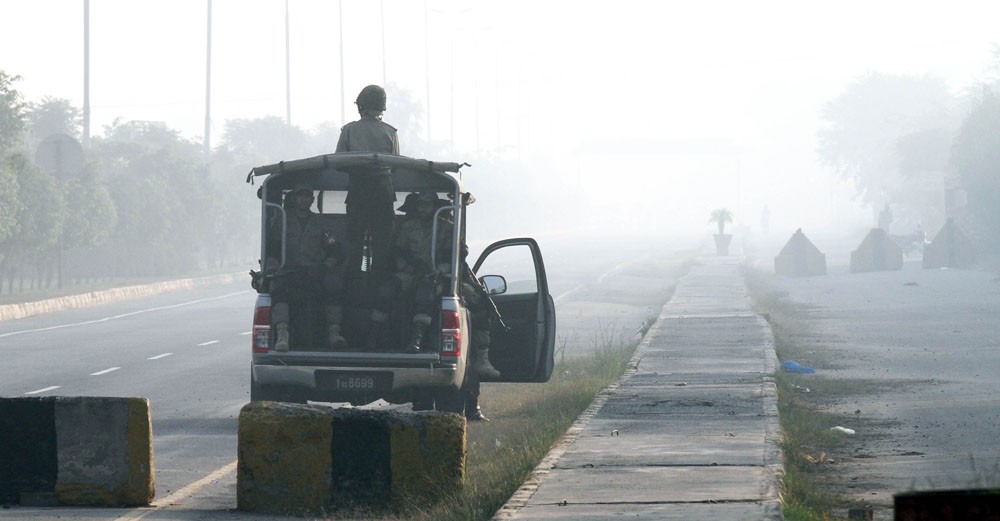
The Wagah attack calls for a well-prepared counter terror policy and strong internal security

The overall debate following the attack near Ground Zero at Wagah border remained largely focused on which of the terrorist outfit -- of the three that claimed responsibility -- would be a genuine perpetrator.
The planners of this heinous act, no doubt, failed to reach Ground Zero and inflict casualties on the Indians as well; however, they seem to have succeeded in diverting the attention of the whole nation and intelligentsia from the real issue of hydra-headed militancy when, by design or default, more than one terrorist network accepted the responsibility.
By all accounts it was an ill-fated Sunday; when, as usual, thousands of people were returning home after watching the emotionally charged flag-lowering ceremony jointly staged by Pakistani and Indian border guards when the blast took place, killing 63 and injuring more than hundred others.
As if claiming of responsibility for a terrorist act by a number of networks was a bigger news, in the follow up talks and discussions involving security experts, media professionals and political leaders stress was on determining the capability of one of the three terrorist networks -- the Jundullah, Tehreek-e-Taliban Pakistan Jamaat-ul-Ahrar (TTPJA) or the little known Mahar Mehsud group -- that claimed to have carried out the act.
All being clueless, nobody tried to look at the possibility that this may be the terrorists’ strategy to divert attention from the mushrooming militancy stretching from the western mountain edges to eastern flanks of the country.
Lost in futile argumentations, the countrywide debate has gone astray and off the point, as it makes no difference who sent the bomber to kill civilians in a situation where without exaggeration, scores of militant networks are operating, some in connivance with state apparatuses and others independently.
It was all horrible and irrelevant; proving that our state functionaries and intelligentsia are still living in a state of denial, not accepting Pakistan is home to scores of terrorist networks and militant groups, all enjoying ultimate freedom in choosing the targets.
It was believed that the country’s intelligentsia, security and political establishments -- till date indifferent to hundreds of such deadly terrorist attacks in FATA, Khyber Pakhtunkhwa and Balochistan -- would take the Wagah tragedy as an opportunity for threadbare discussions on the existentialist threats posed by militancy to Pakistan.
In the followup talks on media what was glaringly missing was the discussion on questions like ‘why militants chose Ground Zero for a bloody attack?’ Had the bomber succeeded in striking at Ground Zero what would have been the likely scenario between Pakistan and India? Of the numerous similar attacks in the past, no culprit has ever been awarded punishment. Was it a revenge act for Zar-e-Azb operation going on in faraway mountains of North Waziristan or a locally designed and executed act?
The situation has been further compounded by blindly relying on the assertions of militant groups following such incidents. This blind following of militants’ claims has turned out to be our national character as even the state institutions -- responsible for probing such heinous attacks on scientific lines, stop further investigations once a militant group claims responsibility.
The Wagah attack is an important sign of the beginning of the militants’ blowback from North Waziristan operation that is gathering more force. It is most likely that the militants -- flushed out (not killed) from their hideouts during military operations, are regenerating. There are ever-more violent groups now to make their presence felt in the beginning.
There is a need to clinically assess and conduct thorough audit of all the military operations, particularly the Zarb-e-Azb operation going on in North Waziristan agency -- dubbed as ‘final war against militancy’ when it was launched some five months ago.
The media wing of the military claims to have killed more than 1000 militants and of destroying scores of militant hideouts and training centres during the ongoing military strikes in North Waziristan. But people are skeptical, they question why not a single important/senior commander of militants has been killed or arrested from a region that was headquarter to nearly all terrorist networks. More likely, the militants along with their leadership have moved to mountains but not eliminated yet.
In the same fashion if security forces claim to have arrested hundreds of facilitators from the major population centres during over two thousand small scale intelligent operations, then how do suicide jackets and other paraphernalia for killing civilians reach the bombers at a target site hundreds of miles away from ‘terrorist hideouts’.
Pakistan has lost thousands of innocent lives and billions of dollars infrastructure over the years to terrorists.
Just ask about militancy from a man from Khyber Pakhtunkhwa [an educated one], his simple answer will be; "Pakhtuns are not militants at all; the whole militant phenomenon is based in south Punjab; or he will say, nay it’s all conspiracy against the Pakhtuns. It has almost become a cliché now.
If one asks the same question from a man from Punjab [again educated] he will simply say; "There is no militancy or religious extremism in Punjab; the whole dirt is lying in Khyber Pakhtunkhwa and tribal areas."
Likewise there is a huge gulf between military and political leaders’ approaches towards militancy and religious extremism. Military wants us to differentiate between militants fighting elsewhere and those fighting in Pakistan.
Interestingly, in the whole scenario the state has become totally irrelevant. So far we do not have any policy or working institutions dealing with militancy or religious extremism on different fronts except military operations in the faraway mountains. Pakistan is still an ultimate destination for militants with fresh reports taking rounds that the world new terror syndicate ‘IS or Daish’ is planning bases here.
The Wagah attack calls for a well-prepared counter terror state policy and strong internal security or Pakistan will continue to be haunted by a complex, overlapping and dizzyingly varied militant threat. It will remain a prized militant destination.